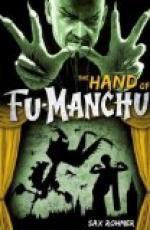Glancing up, I found Nayland Smith’s gray eyes watching me.
“You see the mark, Petrie?” he snapped.
I nodded. The dead man upon the table was a Burmese dacoit!
“What do you make of it?” I said slowly.
“At the moment,” replied Smith, “I scarcely know what to make of it. You are agreed with the divisional surgeon that the man—unquestionably a dacoit—died, not from drowning, but from strangulation. From evidence we have heard, it would appear that the encounter which resulted in the body being hurled in the river, actually took place upon the wharf-end beneath which he was found. And we know that a place formerly used by the Si-Fan group—in other words, by Dr. Fu-Manchu— adjoins the wharf. I am tempted to believe that this”—he nodded towards the ghastly and sinister object upon the table—“was a servant of the Chinese Doctor. In other words, we see before us one whom Fu-Manchu has rebuked for some shortcoming.”
I shuddered coldly. Familiar as I should have been with the methods of the dread Chinaman, with his callous disregard of human suffering, of human life, of human law, I could not reconcile my ideas—the ideas of a modern, ordinary middle-class practitioner—with these Far Eastern devilries which were taking place in London.
Even now I sometimes found myself doubting the reality of the whole thing; found myself reviewing the history of the Eastern doctor and of the horrible group of murderers surrounding him, with an incredulity almost unbelievable in one who had been actually in contact not only with the servants of the Chinaman, but with the sinister Fu-Manchu himself. Then, to restore me to grips with reality, would come the thought of Karamaneh, of the beautiful girl whose love had brought me seemingly endless sorrow and whose love for me had brought her once again into the power of that mysterious, implacable being.
This thought was enough. With its coming, fantasy vanished; and I knew that the dead dacoit, his great curved knife yet clutched in his hand, the Yellow menace hanging over London, over England, over the civilized world, the absence, the heart-breaking absence, of Karamaneh—all were real, all were true, all were part of my life.
Nayland Smith was standing staring vaguely before him and tugging at the lobe of his left ear.
“Come along!” he snapped suddenly. “We have no more to learn here: the clue to the mystery must be sought elsewhere.”
There was that in his manner whereby I knew that his thoughts were far away, as we filed out from the River Police Depot to the cab which awaited us. Pulling from his overcoat pocket a copy of a daily paper—
“Have you seen this, Weymouth?” he demanded.
With a long, nervous index finger he indicated a paragraph on the front page which appeared under the heading of “Personal.” Weymouth bent frowningly over the paper, holding it close to his eyes, for this was a gloomy morning and the light in the cab was poor.




